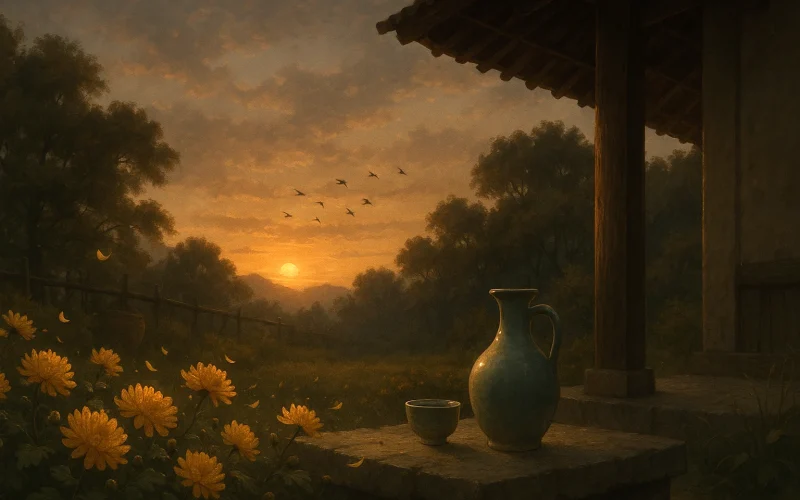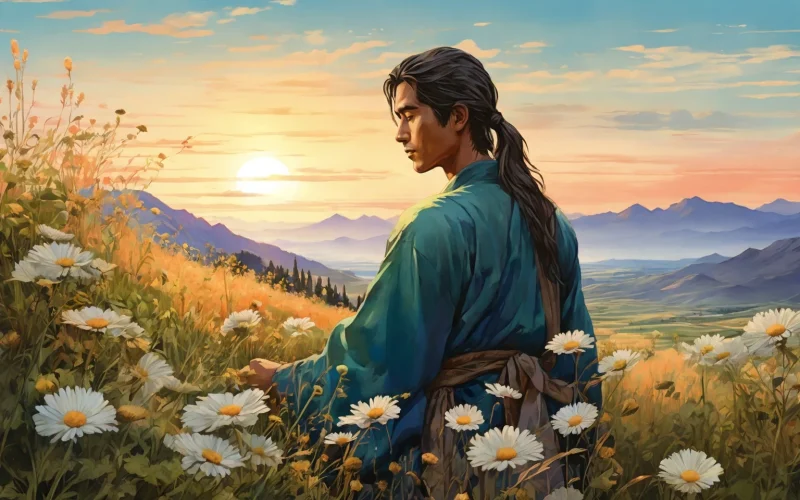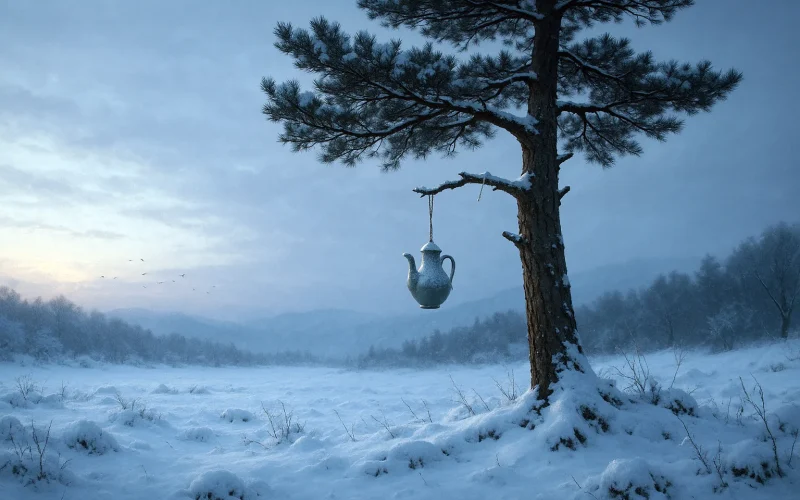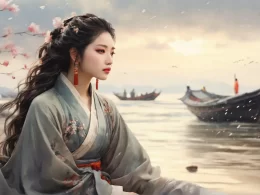Lovely chrysanthemums have autumn hue,
I pluck their fresh petals impearled with dew.
Dew-sweetened wine would drive sorrow away.
How could worldly cares in my heart still stay!
Although I drink with no one by my side,
Wine pours out from the pot when cup is dried.
All the bustle sinks with the sinking sun,
Birds flying to the woods sing on the run.
Proudly I croon in eastern corridor,
Glad to find a nearly lost day once more.
Original Poem
「饮酒 · 其七」
陶渊明
秋菊有佳色,裛露掇其英。
汎此忘忧物,远我遗世情。
一觞虽独进,杯尽壶自倾。
日入群动息,归鸟趋林鸣。
啸傲东轩下,聊复得此生。
Interpretation
Composed around 416 AD, this work belongs to Tao Yuanming's Drinking Wine series, written during his long reclusive years when material poverty coexisted with spiritual independence. Amid frequent dynastic changes and social turmoil, the poet rejected officialdom, seeking solace in nature's chrysanthemums and wine to express transcendental ideals and unfulfilled aspirations. The poem emerged from this contemplative atmosphere of autumn solitude.
First Couplet: "秋菊有佳色,露掇其英。"
Qiū jú yǒu jiā sè, lù duō qí yīng.
Autumn chrysanthemums glow with splendid hues; I gather their blossoms bathed in dawn's dew.
While other flowers wither, chrysanthemums alone bloom—symbolizing noble character. The gathering act represents both life's simple joys and metaphorical self-cultivation.
Second Couplet: "泛此忘忧物,远我遗世情。"
Fàn cǐ wàng yōu wù, yuǎn wǒ yí shì qíng.
Steeping these sorrow-dispelling blooms, I distance worldly attachments further still.
Chrysanthemums infused in wine embody nature's power to dissolve earthly cares, reinforcing his resolute reclusive stance.
Third Couplet: "一觞虽独进,杯尽壶自倾。"
Yī shāng suī dú jìn, bēi jìn hú zì qīng.
Though drinking alone, I pour cup after cup—unaware of solitude.
The poet's self-sufficient revelry demonstrates transcendental contentment in isolation, portraying spiritual fulfillment beyond companionship.
Fourth Couplet: "日入群动息,归鸟趋林鸣。"
Rì rù qún dòng xī, guī niǎo qū lín míng.
Sunset stills all motion; homing birds chorus through the woods.
Twilight's tranquil imagery mirrors the poet's inner peace and belonging to nature's rhythms, resonating with philosophical depth.
Fifth Couplet: "啸傲东轩下,聊复得此生。"
Xiào ào dōng xuān xià, liáo fù dé cǐ shēng.
Chanting proudly beneath my eastern eaves—thus I reclaim this life.
The "proud chanting" reveals liberated spirituality. Though tinged with resignation, the lines ultimately radiate serenity and hard-won transcendence.
Holistic Appreciation
Through chrysanthemums and wine, the poem articulates Tao's devotion to nature, rejection of worldly pursuits, and quiet joy in reclusion. The imagery—autumn blooms, morning dew, twilight birds—weaves an aura of crystalline purity around his "reclaimed life" philosophy. While hinting at unrealized ideals, the work primarily celebrates spiritual freedom beyond societal conflicts.
Artistic Merits
The poem's style is deceptively simple and natural, with language as plain as everyday speech, yet it achieves profound philosophical depth and far-reaching significance. Tao Yuanming excels at embedding profound thoughts within mundane details—expressing intense emotions through understated brushstrokes, channeling feelings through landscapes, and conveying ideals through objects. The entire work carries a refined and unworldly tone, where seemingly plain language reveals an inherent strength of character. The concise yet richly symbolic imagery epitomizes the quintessential style of his "hermit poetry."
Insights
Through the acts of drinking wine, gathering chrysanthemums, and contemplating nature's beauty, the poet demonstrates an attitude of transcending worldly chaos and returning to nature's purity. In a turbulent and uncertain world, only by preserving inner nobility and independence can one truly attain the serenity and freedom encapsulated in "thus I reclaim this life." With his unadorned verses, Tao Yuanming teaches us: resisting conformity and staying true to one's essence are the paths to living with clarity and ease—forging one's own way back to spiritual belonging.
Poem translator
Xu Yuanchong (许渊冲)
About the poet

Tao Yuanming(陶渊明), 365 – 427 CE, was a poet, literary figure, fu writer, and essayist active during the late Eastern Jin and early Liu Song dynasties. Born in Chaisang (near present-day Jiujiang, Jiangxi Province), he pioneered a new genre of pastoral-themed literature, expressing profound philosophical insights through simple language. His poetic style became an enduring aesthetic standard in classical Chinese poetry.











